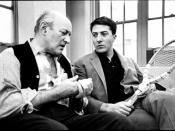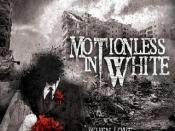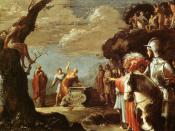The words, ÃÂNothing's planted. I don't have a thing in the ground,ÃÂ were spoken by Willy Loman as he began to realize his tragic flaws which inevitably lead to his downfall. In Arthur MillerÃÂs ÃÂDeath of a SalesmanÃÂ Willy Loman takes on the characteristics of a ÃÂmodernÃÂ tragic hero rather than the tragic hero defined by Aristotle, while the play itself proves to take on the characteristics of a tragedy.
Willy Loman displays a number of qualities of which Aristotle would consider to be that of a tragic hero, he encompasses harmatia which takes form in his foolish pride, and dreams he could not accomplish. Throughout the play it is pointed out to the reader that WillyÃÂs foolish pride has lead to the failure of achieving his dream as well as financial imbalance. Pride leads Willy to shield himself in delusion rejecting any blame that could fall upon him and constantly blaming others for all that goes wrong in his life.
By blaming others for all that goes wrong Willy is never able to see his errors and correct them, instead he stuck in more of a childish rut.
Willy seems to disregard the fact that he has played an extensive role in effecting his sons negatively, particularly Biff, until he is caught in the act of infidelity by his son; even when caught in an obvious act of wrongdoing he seems to be angered at Biff and does not speak to him as if that would stop the reality of the act and hault the blame from stricking.
It is not until all is coming to a close that Willy is forced to observe that he has not left any good behind and in final attempts to leave some sort of mark commits suicide to leave behind insurance money which could help his Biff. Before suicide Willy realized he was at the root of his own destruction and that possibly the only way to help those he loved was by sacrificing himself.
Though it seems Willy LomanÃÂs character has attained all of AristotleÃÂs requirements there is an inconsistency, he is a common man. Greek tragedyÃÂs and moreover AristotleÃÂs consideration of a tragic hero depict someone of great stature and of a higher class, both of which Willy evidently lacks; however WillyÃÂs character gives life to a new tragic hero, that of the common man who faces struggles most might encounter. The common stance is one which manages to appeal widely. The ÃÂcommon manÃÂ and situations such as those depicted in ÃÂDeath of a SalesmanÃÂ are those which the common person can relate to and is effective in arousing pity in the audience. Willy, like many Americans, had his own interpretation of what the ÃÂAmerican dreamÃÂ was and he tried to accomplish it however failed miserably.
As the play comes to a close Willy stands right outside his kitchen door deciding he will give his life up for the possibility of bringing happiness to his family. ÃÂLoves me. Always loved me. IsnÃÂt that a remarkable thing? Ben, heÃÂll (BiffÃÂll) worship me for it!ÃÂ Willy decided referring to his son and the money that would come after his death. With his death he aroused little pity, however brought about more pity in life and so it is an extension of a classical tragedy which has sprung into a new class of tragedy and along with it a modern tragic hero.
Works CitedBarbara F. McManus. Outline of AristotleÃÂs Theory of Tragedy. Cnr.edu, 2001. 15 Jan 2009Learnhub, Elements of Tragic Hero. Learnhub.com, 2008. 15 Jan 2009





